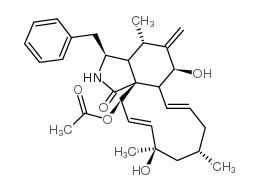Characterization of kinase suppressor of Ras-1 expression and anticancer drug sensitivity in human cancer cell lines.
Scott M Stoeger, Kenneth H Cowan
文献索引:Cancer Chemother. Pharmacol. 63(5) , 807-18, (2009)
全文:HTML全文
摘要
Previous studies have indicated that the ERK1/2 MAP kinase signaling pathway plays an important role not only in cell growth, cell cycle regulation, and differentiation, but also in determining the sensitivity of cells to anticancer agents as well. Furthermore, expression of kinase suppressor of Ras-1 (KSR1), a molecular scaffold that modulates signaling through the ERK1/2 MAP kinase pathway, has been shown to influence the cellular sensitivity to the anticancer agent cisplatin. To further define the role of KSR1 expression on drug sensitivity, the expression of KSR1 was examined in the NCI60 anticancer drug screen, a panel of cancer cell lines representing nine tissue types, established by the Developmental Therapeutics Program (DTP) at the National Cancer Institute (NCI). The expression of thousands of molecular targets has been examined in the NCI60 panel as well as the cellular toxicity for greater than 400,000 compounds. KSR1 expression varied almost 30-fold difference between the highest and lowest expressing cell lines in the NCI60. Using the COMPARE analysis algorithm, KSR1 expression was correlated with sensitivity of the compounds screened by DTP and several novel agents were identified whose sensitivity correlated with KSR1 expression in the NCI60 panel. Cytotoxicity of two agents, cytochalasin H and tunicamycin, identified through the COMPARE analysis of KSR1 expression and drug sensitivity, was also examined in wild type (KSR(+/+)) mouse embryo fibroblasts (MEFs) and MEFs deficient in KSR1 expression (KSR1(-/-)). These studies demonstrated enhanced sensitivity, as well as increased ERK activation, in KSR(-/-) MEFs following exposure to tunicamycin or cytochalasin H compared to KSR(+/+) MEFs. Furthermore, restoration of KSR1 expression in KSR(-/-) MEFs following stable transduction of cells with a KSR1 expression vector, enhanced sensitivity of cells to tunicamycin and cytochalasin H and decreased ERK1/2 activation following exposure to these drugs. In addition, the sensitivity to cytochalasin H and tunicamycin of breast cancer cell lines with low KSR1 expression, (HS578T and MDA-MB-231/ATCC), was increased relative to the sensitivity of breast cancer cells with higher levels of KSR1 (MCF7). These studies indicate that KSR1 may play an important role in the determination of cellular sensitivity to anticancer agents.
相关化合物
| 结构式 | 名称/CAS号 | 分子式 | 全部文献 |
|---|---|---|---|
 |
细胞松驰素 H
CAS:53760-19-3 |
C30H39NO5 |
|
A new fungal isolate from Paspalum scrobiculatum, Linn. with...
1975-01-01 [Acta Microbiol. Acad. Sci. Hung. 22 , 253, (1975)] |
|
Effects of cytochalasin H on chick embryo explants cultured ...
1984-12-01 [Toxicology 33(3-4) , 323-30, (1984)] |
|
Inhibitory effect of cytochalasin H on cell reaggregation of...
1982-01-01 [Exp. Cell Biol. 50(3) , 155-61, (1982)] |
|
L-696,474, a novel cytochalasin as an inhibitor of HIV-1 pro...
1992-05-01 [J. Antibiot. 45(5) , 679-85, (1992)] |
|
Stimulation of Respiratory Motor Output and Ventilation in a...
2015-09-01 [Platelets 11(8) , 467-76, (2000)] |